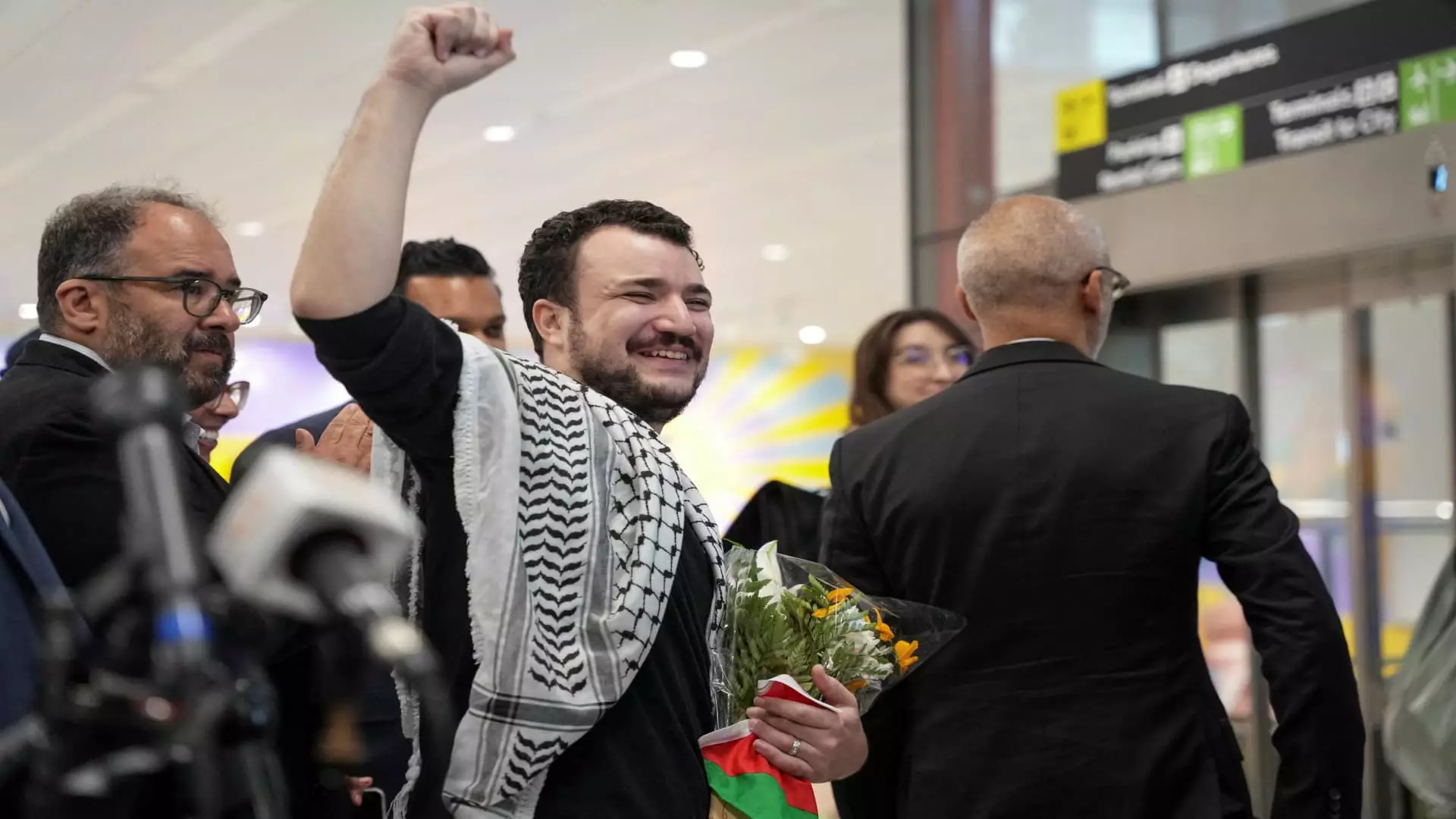In a startling upheaval of American values, Mahmoud Khalil’s recent release from ICE detention lays bare the frightening implications of political persecution in a so-called democratic society. Khalil, a 30-year-old Columbia University student and passionate advocate for Palestine, was arrested in March amidst growing tensions and controversy surrounding the Israel-Palestine conflict. His imprisonment for more than three months serves not only as a testament to the troubling state of free speech in America but also underscores a grave warning about government overreach cloaked in the guise of maintaining national security.
The audacity of Khalil’s protest—voicing dissent against what he described as a genocide in Gaza—landed him in one of America’s most notorious detention centers. Transported thousands of miles from his home in New York to Louisiana, he became the focal point of a national conversation about the limits of political expression. As Khalil emerged from the shadows of confinement, flanked by his wife and supporters, his defiance resonated with a clarity that was impossible to ignore. His declaration that “my existence is a message” encapsulates a profound sense of resistance that should resonate with all advocates of justice and freedom.
Political Persecution and the Fight for First Amendment Rights
Rep. Alexandria Ocasio-Cortez’s comments referring to the imprisonment as a politically motivated act hit home: when dissent is met with detention, the very fabric of our democracy is frayed. The First Amendment guarantees everyone the right to speak freely; stifling voices for peace in Palestine through fear of imprisonment signals a dire warning that we are walking a treacherous path toward authoritarianism.
Khalil’s case is a chilling reminder that political persecution can infiltrate educational institutions where students should freely question, challenge, and protest without fear of detention. The government’s insistence that Khalil posed a threat is ironic given the position taken by those in power: when whistleblowers and advocates for peace are silenced, the machinery of power operates unchecked. This case serves as a clarion call to those who value civil liberties.
Systemic Injustices and the Deepening Crisis
The U.S. government’s justification for Khalil’s detention raises questions not just about individual rights but about the systemic injustices that still permeate our immigration policies. The invocation of vague national security claims, derived from an antiquated legislative framework, is emblematic of a fear-based system that undermines the very principles it claims to protect. Reports indicate that the accusations against Khalil were based on dubious, unverified evidence—a revealing insight into how easily state power can be harnessed to intimidate marginalized voices.
In a landscape where protests against the war in Gaza gained momentum, Khalil embodied the spirit of resistance that has become synonymous with the call for justice within U.S. borders. His leadership role in protests at Columbia not only sparked dialogue but inspired similar movements on campuses across the nation, creating a powerful ripple effect. This burgeoning movement for social justice underscores that dissent should be met with encouragement, not oppression.
Echoes of Resistance: The Broader Context
Khalil’s release does not occur in isolation; it reflects a deeply entrenched struggle faced by many activists, particularly those from marginalized backgrounds. The parallels to other recent detentions of academics and activists—like Rümeisa Öztürk and Mohsen Mahdawi—reveal a pattern of targeting dissenters who dare to advocate for global justice. Each case contributes to a chilling narrative of the current administration’s tactics: silence voices that challenge the status quo by any means necessary.
Khalil’s activism and the subsequent backlash he faced illuminate the fragility of civil rights in today’s political climate. His imprisonment is not merely an affront to personal liberty; it acts as a stark reminder that empowering dissenting voices is essential in a healthy democracy.
As Khalil steps back into the realm of activism—determined to continue his fight for Gaza, undeterred by threats to his safety—he exemplifies the emerging spirit of resistance that resonates within all of us. In a world where the fight for justice often comes at a steep price, his journey is also a beacon of hope for those still standing up in the face of tyranny and oppression. The implications of his story extend far beyond the individual, reverberating through the collective struggle for justice, free speech, and human rights universally.


Leave a Reply